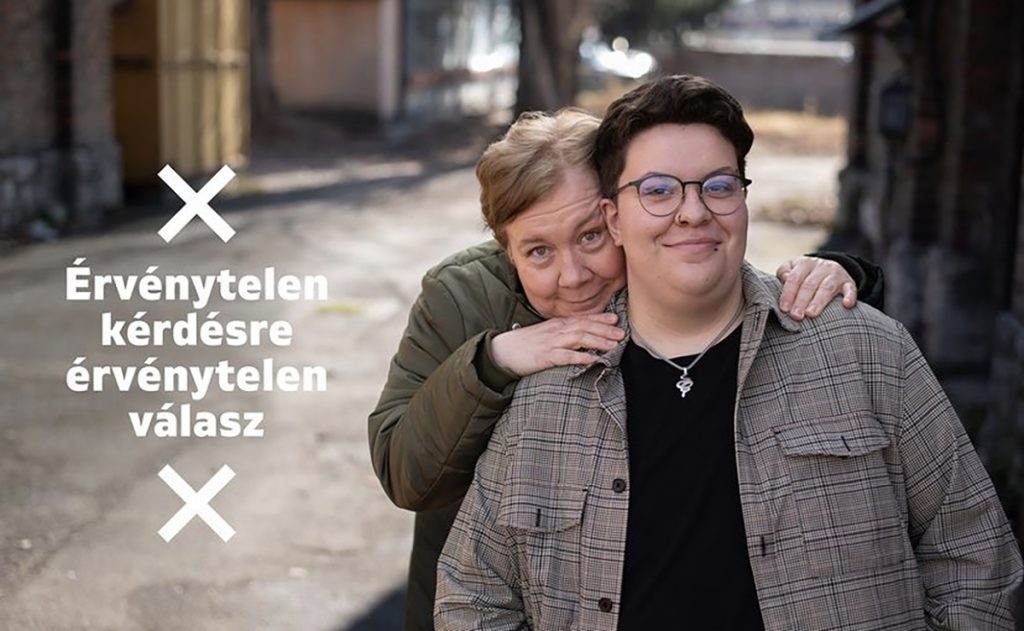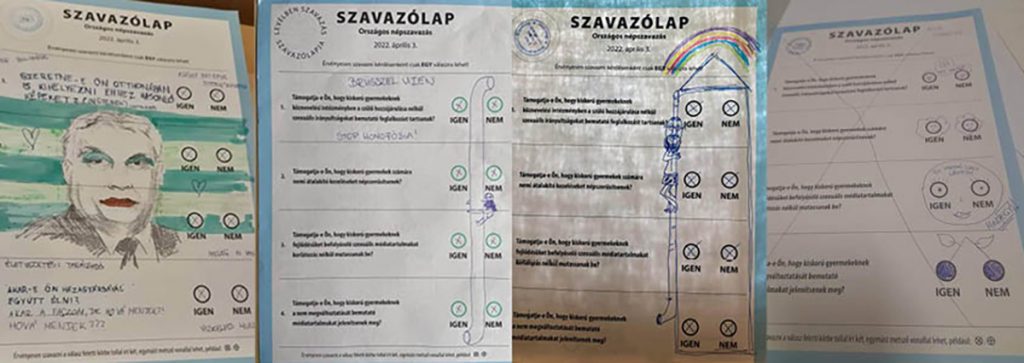Dóra Oprics explores the 2X campaign in Hungary, in which 1.7 million Hungarians successfully invalidated an exclusionary child protection referendum. The outcome reveals insights into the mobilising powers of grassroots activism against attempts to demonise the LGBTQIA+ community
In November 2021, Viktor Orbán's Fidesz government called a national referendum for the following spring. The government's aim was to gain approval for its so-called Child Protection Act. The referendum asked voters four questions:
The questions were manipulative, judgmental and implied a predetermined acceptable response. Appalled, Hungarian civil society organisations mobilised, launching the campaign, To Invalid Questions, Invalid Answers, or 2X. Their campaign urged voters to invalidate their ballot papers by responding to each question with two Xs rather than one.
Referendum questions were manipulative, judgmental, and implied a predetermined response
The referendum needed 4.1 million affirmative votes to pass the legislation. In the event, the government got only 3.5 million votes in support. The civil society campaign thus played a critical role in blocking the proposed legislation.
The referendum came about as a direct consequence of the 2021 LXXIX Child Protection Act. At first, Hungarians welcomed the Act. It had seemed like an attempt to strengthen child protection with a clear focus on paedophile offenders. But the Act soon became a new means for the government to demonise LGBTQIA+ Hungarians, restricting their representation in the media and in the school curriculum.
Attitudes to the Act swiftly changed, and there was national and international backlash. The Venice Commission published an opinion piece confirming the legislation was incompatible with international human rights standards. In response, Orbán claimed that his government’s illiberal, exclusionary tactics were well within Hungary’s discretionary authority. To prove his point, he called the referendum.
The referendum was a classic example of Andrea Pető's illiberal offer. The 'offer' promises social security and acceptance as a reward for following community norms and suggested core values. It reassures the individual that, in their choice of excluding one social group, they are able to stay 'safe' in another.
Referendum questions were designed to reassure the individual that by excluding one social group, they could stay 'safe' in another
Marton Gera calls this phenomenon out-groups and in-groups. He argues that LGBTQIA+ individuals stand in opposition to everything the in-group represents. The referendum questions gave a clear indication of who the in-group is. Child protection is a central element of illiberal rhetoric designed to secure future illiberal voters.
The 2X campaign mobilised a huge number of supporters. It revealed how fomenting division between in-groups and out-groups will not resolve the child protection crisis. Contrary to government instructions, 1.7 million voters invalidated their ballots with 2Xs. Several factors explain the campaign's success.
First, it had online and offline presence, guerilla action, and large-scale happenings. There was even a roadshow that visited 20 rural locations in a week. Activists engaged with the older generation and people outside their own political echo chamber. National and international press across the political spectrum covered the campaign. This generated discussion and familiarised people with the option of spoiling their ballot papers.
Second, a recent survey shows that the Hungarian public is becoming more accepting of LGBTQIA+ rights. Many invalid votes were likely because Hungarians refuse to align with exclusionary Fidesz politics.
The grassroots campaign used simple visuals and personal stories. It deliberately avoided the rainbow colours commonly associated with LGBTQIA+ campaigning
Third, the organisations themselves were not at the forefront of the campaign. In the current climate, NGOs are not popular with the general public. Most right-wingers are suspicious of the kind of organisations Orbán calls 'Soros agents'. Moreover, the opposition coalition's largely passive behaviour probably helped the campaign. Final numbers reveal that many of those who invalidated their ballots must have been Fidesz supporters.
Finally, the social media video campaign on NGOs' Facebook, YouTube and Instagram pages used simple visuals, easily understandable and touching messages, personal stories, and solid colours. It deliberately avoided the rainbow colours commonly associated with LGBTQIA+ campaigning.

The campaign's main message was that regardless of one's position on the queer spectrum, every individual is equally Hungarian and deserves to be treated with equal respect. According to Facebook statistics from Háttér Society, Hungary's biggest LGBTQ rights organisation, the top eight videos amassed over 1.3 million unique views and garnered more than 180,000 interactions:
| Impressions | Reach | Views | Clicks | |
| Number of views on a piece of content | How many times the video was seen by a unique person | After 60 seconds | Engagement | |
| In one boat 2 | 606,489 | 368,386 | 12,695 | 29,466 |
| How could we be happier in Hungary? | 495,215 | 307,409 | 5,090 | 37,567 |
| In one boat 1 | 391,991 | 259,448 | 4,467 | 53,642 |
| Tibi and Ági | 385,473 | 186,990 | 9,955 | 30,411 |
| Check in from the roadshow | 206,712 | 116,539 | 5,174 | 4,205 |
| Eszter and Márió | 170,037 | 101,118 | 4,180 | 22,113 |
| Kinga and Mihály | 50,390 | 42,175 | 3,935 | 2,867 |
| Ági and Emmett | 13,153 | 11,610 | 1,153 | 965 |
| Total numbers | 2,319,460 | 1,393,675 | 46,649 | 181,236 |
The online campaign may have had only minimal reach, but it generated buzz about the issue. The campaign succeeded in sparking conversations, engaging people with the topic, and helping them see LGBTQIA+ individuals and allies in a new light. This enabled activists to bridge the gap the government had created. Indeed, hundreds of people decorated their ballots with drawings and messages about inclusion to protest against the way the referendum had been designed:

The campaign called on Hungarians to exercise their rights. They did so in droves. Standing up for democracy, 1.7 million voters spoiled their ballot papers, and succeeded in making a difference.
No.33 in a thread on the 'illiberal wave' 🌊 sweeping world politics

This blog piece was written for the course 'Gendering Illiberalism', co-designed and co-taught by Andrea Pető (with TA Irfana Khatoon) and Alina Dragolea (with TA Oana Dervis) sponsored by CIVICA alliance universities Central European University (CEU) and the National University of Political Studies and Public Administration (SNSPA).